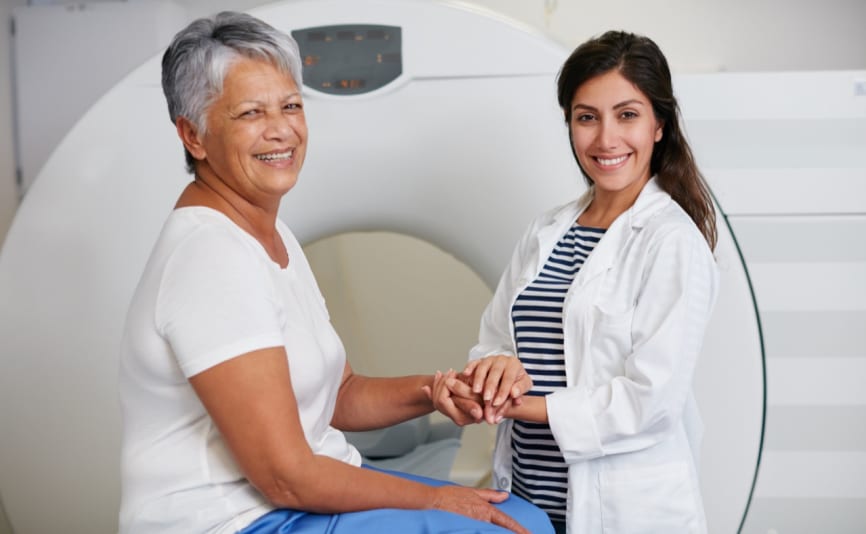MRI scans are used to diagnose a range of health conditions affecting different parts of the body, causing a wide variety of symptoms. Having an MRI scan is an important step in discovering what may be causing your symptoms, but it can also be a worrying time, especially if you don’t know what to expect.
In this article, we’re going to discuss the key things you need to know before having an MRI scan. But first, here’s a quick look at what an MRI scan is.
Here’s our useful guide to what to do and, crucially, what not to do before an MRI scan.
1. Don’t Wear Metal Jewellery Or Accessories
MRI machines use radio waves and strong magnetic fields to create detailed images of the inside of your body, including your bones, soft tissues, organs and blood vessels.
Due to the magnetic field, metal objects pose a dangerous risk to your health if they come into contact with the magnets, as they could cause serious damage inside your body if they move.
Therefore, top of the list of what not to do before an MRI is taking anything metallic into the MRI scanning area.
Before your scan, you’ll be asked to remove any jewellery, watches, piercings, hair clips and any other accessories to ensure your health and safety, and that of the medical team and equipment. Even the smallest piece of metal, such as an earring, could become a dangerous projectile, causing cuts or burns to your body, including your eyes, or could even get pulled into your body.
2. Avoid Clothing With Metal Zippers Or Buttons
For the same reason as above, any clothing that contains metal must be removed before getting into an MRI machine. This includes belts with metal clasps, bras with metal fastenings and any clothing with metal buttons and zips.
To ensure your health and safety, most MRI scans will require you to undress completely and change into a hospital gown. You’ll be given a locker to safely store your clothing and belongings for the duration of your MRI scan.
3. Remove Electronic Devices & Hearing Aids
Most removable electronic medical devices, such as hearing aids, and some removable dentures and dental work, contain metal, and they must also be removed before entering the MRI machine. If you’re unsure, your doctor will be able to advise.
It’s not always easy to know if metal objects contain magnetic metals such as iron, cobalt and nickel. So it’s important to remove anything metallic (that can be removed) before entering the MRI scanning area.
4. Make Sure To Inform Staff About Medical Implants
Metal implants, such as a pacemaker, cochlear implants, heart valves, pumps and stents cannot be removed before having an MRI scan. The same applies to any prosthetic joints and metalwork to repair broken bones.
Therefore, it’s important to let your doctor know if you’ve ever had any kind of metal implant fitted or surgery that meant you have metalwork in your body. If in doubt about any previous surgery, it’s always a good idea to mention it.
Some newer types of implants and prostheses may contain no metal or non-magnetic metals that are safe in an MRI machine. Take any relevant paperwork with you to your appointment so that your doctor can ascertain the type of implant you have.
Let your doctor know if you have any other metal inside your body, such as shrapnel, metallic shards or bullets.
If you’re not suitable for an MRI scan, your doctor may suggest different types of scans, such as CT scans and X-rays, depending on your symptoms and medical history.
5. Don’t Wear Makeup, Creams, or Lotions With Metallic Particles
You may be unaware, but some skincare products contain tiny microparticles of metal. This can include aluminium in antiperspirants, iron oxides to add red, yellow and brown pigments to concealers, foundations, eye shadows and lipsticks, and chromium used to create green pigments in eye makeup and nail varnish.
If you’re at all in doubt, avoid using creams and sprays after showering on the morning of your appointment, and don’t apply makeup.
6. Don’t Eat If Contrast Is Required
Some MRI scans require the use of a contrast dye to help highlight the differences between certain areas of the body, such as soft tissues and blood vessels, and the fluids that surround them. This dye, sometimes called a contrast agent, is injected into a vein, usually in the arm.
Contrast dyes usually contain a substance called gadolinium, which helps certain tissues appear brighter on an MRI image to give doctors a clearer view. Some people experience allergic reactions to gadolinium - if you have a known allergy to this or have experienced allergic reactions to contrast dyes in the past, let your doctor know.
Symptoms of an allergic reaction to a contrast agent include feeling sick, dizzy and flushed. However, some people experience nausea and vomiting after having a contrast agent injected, without developing full allergic reactions.
Therefore, in most cases, if you’re having a contrast dye MRI, you’ll be asked to refrain from eating for a few hours before your appointment. You can drink small amounts of water.
This helps to reduce the dangers of vomiting while lying down in the MRI machine. Once your scan is complete, you’ll be required to remain in the clinic for half an hour to ensure you don’t develop symptoms of an allergic reaction. Once you’re free to go, you’ll be able to eat and drink water as normal.
Your doctor will let you know if you need a contrast dye MRI scan, and whether or not you need to fast beforehand.
7. Don’t Chew Gum Or Wear Metal-Containing Dentures
If you’ve been told to avoid eating before having your MRI scan, you should also refrain from chewing gum and smoking during this fasting period.
You should also refrain from chewing gum during your scan, as this could distract you from keeping still, and chewing gum could distort MRI images. It also poses a choking risk if you’re chewing while lying down.
If you wear dentures, these will also need to be removed before entering the MRI machine, as many sets of dentures contain metal. If you have a case that you keep your dentures in, it’s helpful to bring it with you to your appointment.
8. Don’t Ignore Instructions From Your Doctor Or MRI Technician
Having an MRI scan may feel daunting and overwhelming, especially if you’re being investigated for a serious health condition. Your MRI technician (called a radiographer) will know and understand, and they’ll do all they can to help you.
Therefore, it’s important to listen to what they tell you and to follow their instructions fully. This will ensure your MRI scan is completed as smoothly and as quickly as possible, and that you’re safe and as comfortable as you can be.
To get the best images, you’ll be required to remain still throughout your scan, and you may be asked to hold your breath for a few seconds on a few occasions.
An MRI scanner makes a loud knocking noise as the strong magnetic field is turned on and off. MRI machines can also feel closed in, especially if you struggle with claustrophobia. Your radiologist will provide you with headphones to help you relax, and you’ll be able to communicate with them through an intercom.
9. Inform Staff If Pregnant Before Entering The MRI
If you’re pregnant, or there’s a chance that you might be, let your doctor know before having your MRI scan. There’s no evidence that MRI scans pose a risk to pregnant women, but your doctor will decide whether or not you should have one, based on your symptoms, medical history and circumstances.
10. Don’t Have Cards or Other Items in Your Pockets
You’ll be provided with a hospital gown to change into before your scan. But bank cards, coins, keys and mobile phones all potentially contain magnetic metals, so don't be tempted to take them with you into the MRI machine scanning room.
You’ll be provided with a locker or other safe space to keep your valuables. But if in doubt, leave them with a loved one who may be accompanying you to your appointment, or leave them at home.
Get an MRI Scan
If you’ve been told by your doctor that you need an MRI scan, and you’re concerned about NHS waiting times, use our simple MRI scan booking system to book your private MRI scan appointment. You could be seen in a matter of days, meaning you’ll be closer to a diagnosis and the right treatment plan for you.
References:
Website, N. (2025, July 9). Who can have one. nhs.uk. https://www.nhs.uk/tests-and-treatments/mri-scan/who-can-have-it/
How to stay safe when getting an MRI. (2017, February 28). Yale Medicine. https://www.yalemedicine.org/news/mri-safety
User, G. (2024, July 24). What not to do before you get an MRI — Radiology Associates Imaging. Radiology Associates Imaging. https://www.radiologyassociatesimaging.com/news-and-views/2023/2/14/what-not-to-do-before-you-get-an-mri







